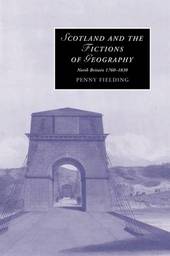
|
Scotland and the Fictions of Geography: North Britain 1760-1830
Paperback / softback
Main Details
Description
Focusing on the relationship between England and Scotland and the interaction between history and geography, Penny Fielding explores how Scottish literature in the Romantic period was shaped by the understanding of place and space. This book examines geography as a form of regional, national and global definition, addressing national surveys, local stories, place-names and travel writing, and argues that the case of Scotland complicates the identification of Romanticism with the local. Fielding considers Scotland as 'North Britain' in a period when the North of Europe was becoming a strong cultural and political identity, and explores ways in which Scotland was both formative and disruptive of British national consciousness. Containing studies of Robert Burns, Walter Scott and James Hogg, as well as the lesser-known figures of Anne Grant and Margaret Chalmers, this study discusses an exceptionally broad range of historical, geographical, scientific, linguistic, antiquarian and political writing from throughout North Britain.
Reviews'The book's strength lies as much in lovely, nuanced readings such as this demonstrating the continuing interest and appeal of an almost forgotten writer, as it does in the larger arguments about enlightenment historiography. Both qualities, however, make Fielding's work an important contribution to the growing field of late eighteenth- and early nineteenth-century Scottish studies.' Scottish Literary Review
|